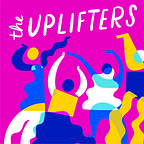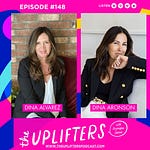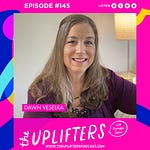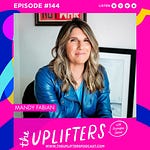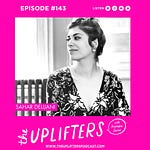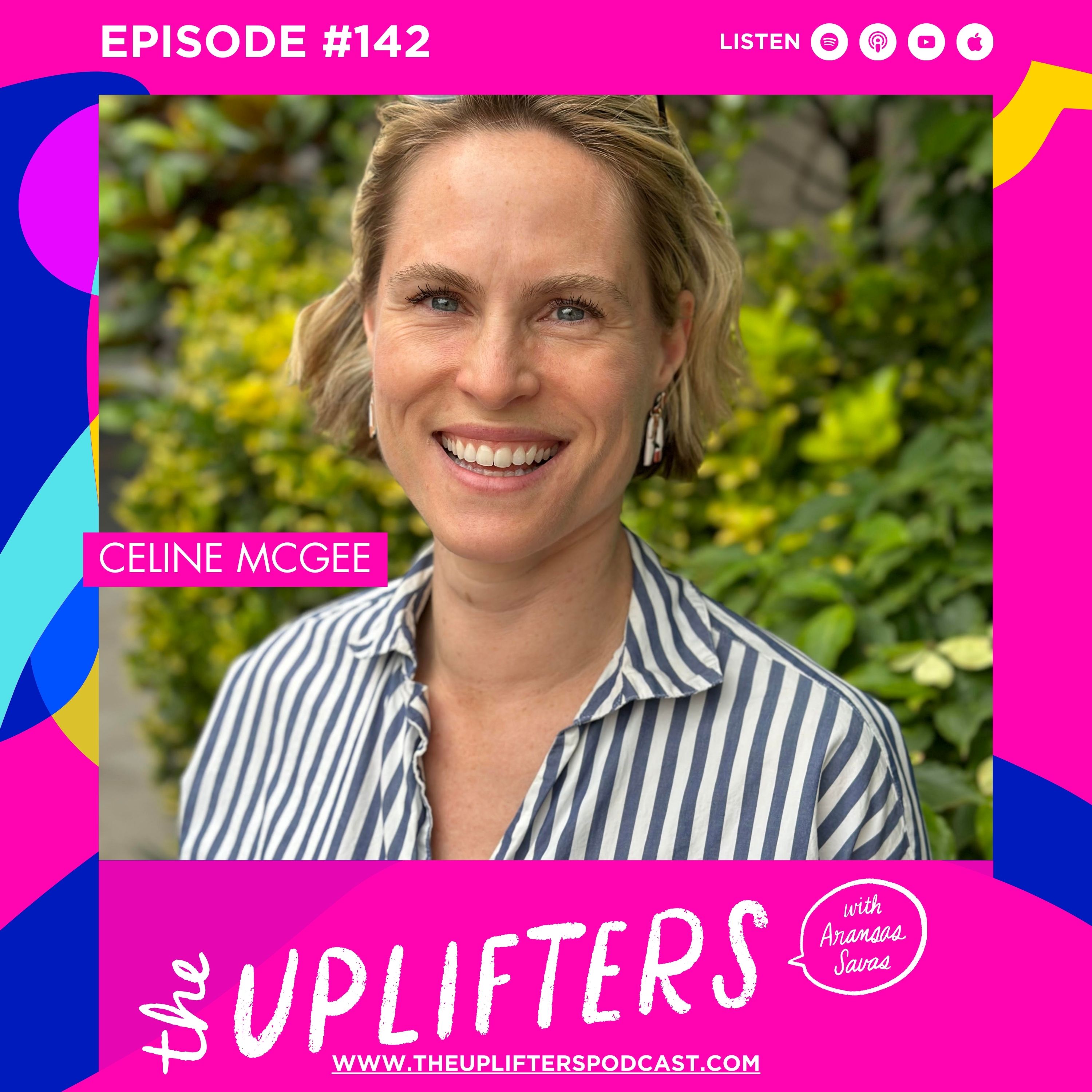“I was tired of feeling run over all the time. I started feeling down and mopey about things. And I just didn’t know how to turn them around. I was taking on too much and I was trying to carry too much.”
-Alexis Nelson
Today’s guest, Alexis Nelson, was nominated for The Uplifters Podcast by Beth Raynor Webb, from episode 5. At 33 years old, Alexis has already spent 14 years in the Air Force. Like so many Uplifters, she finds joy and satisfaction in caring for others, but she also had to learn earlier than most what it takes to sustain her service.
Her work has landed her in physically and emotionally intense situations that have taken a toll on her mental and physical health. As doctors searched for underlying causes, like MS and other mimickers, they ultimately found that acute stress was the real culprit. To treat it she learned small and simple ways to care for herself daily.
Listen to the full conversation to hear:
How the Airplane Mask Theory helped Alexis put her well-being in perspective
The small steps she took to slowly and steadily reclaim her health
The daily practices she uses to maintain her physical and emotional health
Her approach to setting and keeping boundaries
How she stops swirls of “ick” when they start
Her exact script for asking for support or a timeout when she needs it
My new theory that Uplifters aren’t just carrying the weight of others’ needs on our shoulders, but in bulging kangaroo pouches
Let’s keep rising higher, together,
Aransas
PS: Our show is entirely listener-supported, so if you find value in these conversations, please consider supporting us by becoming a paid subscriber. 💓
MESSY TRANSCRIPT
Welcome to The Uplifters Podcast! I’m your host Aransas Savas, and you just heard Beth Raynor Webb who we met in episode 5, introducing Alexis Nelson, a woman who inspires her. Today, we’ll meet Alexis to learn more about her journey and where she finds her inspiration. Alexis, welcome!
I love that Beth highlighted your courage and curiosity in her introduction. What three words do you think best describe you?
What experiences have had the biggest influence on shaping you?
TRANSCRIPT
Aransas Savas (00:01.398)
Welcome to the Uplifters podcast. I'm your host, Aransas Savas, and you just heard Beth Raynor-Webb, who you met and probably fell madly in love with in episode five, introducing Alexis Nelson. So today, we're gonna meet Alexis to learn more about her, her journey, and where she finds her inspiration. Alexis, welcome.
Alexis Nelson (00:30.973)
Thank you for having me.
Aransas Savas (00:32.814)
Thank you for being here. I love that Beth highlighted your courage and your curiosity in her introduction of you. What three words do you think best describe who you really are?
Alexis Nelson (00:48.781)
Oh man, I would say for sure creative, adventurous. I'm gonna go bubbly. I love being, I love having just fun, exciting moments and we all like being happy and feeling happy. So I think it's contagious and it's definitely important to kind of carry through, but.
Aransas Savas (00:55.67)
Hmm.
Aransas Savas (01:10.774)
That's such a nice combo, too. Creative, adventurous, bubbly. How does creative show up in your life?
Alexis Nelson (01:18.449)
I definitely have always been super drawn to art in all forms. I went to fashion design school and I was very young in college, learned how to sew when I was young, paint every once in a while, do photography. So I kind of dabble in a little bit of everything, just making fun, beautiful, whatever I guess emotional you're feeling. But it's definitely a huge part of my life and definitely an outlet for me.
Aransas Savas (01:46.102)
and adventurous? What does that look like?
Alexis Nelson (01:48.665)
Yeah, so I've been all 50 states, which is one of my accomplishments I wanted to do before I was 30, and knocked that one out. And then my life in the military has brought me tons of different places, but it's so fun to, once I get there, not only bloom or implanted, but kind of explore those areas too. So if I never go back to an area, I want to accomplish everything that I want to see, eat, do, that kind of stuff.
Aransas Savas (01:51.542)
Waaaaaaah!
Alexis Nelson (02:17.923)
So just making sure I'm living life to the fullest in those places where I'm at.
Aransas Savas (02:22.654)
And tell me a little bit more about you and the military. What do you do? What is your function?
Alexis Nelson (02:28.665)
Yeah, so I've been a part of the Minnesota Air National Guard for 14 years and it's been a lot of growth, a lot of exciting adventures. There's been some hard things that I've had to grow through as well. But I've gotten to go to so many cool places, meet so many cool people and the experiences that I've pulled from that is just, it's not something that everybody gets to do and see.
Aransas Savas (02:52.179)
Yeah, what drew you to that?
Alexis Nelson (02:55.089)
I would say honestly, I'm third generation, something to do with airplanes. So I was naturally drawn to the Air Force side of things and then trying to figure out what I wanted to do for college. It was just a, well, they'll pay for my tuition and that was pretty attractive to a 17, 18 year old. So that was my main motivator. And then I just, I really grew to love it, love the people I work with and yeah, they bring me on adventures. So I'm pretty happy about that as well.
Aransas Savas (03:14.574)
Sure.
Aransas Savas (03:24.702)
And what are your goals in that arena?
Alexis Nelson (03:28.333)
Sure. So I started in aircraft maintenance working on F-16s and kind of moved my way through the administrative world. right now I'm going to school for meteorology. So I want to take that and try to go from the enlisted to the commission side and commission as meteorologists with the Air Force. Yeah.
Aransas Savas (03:49.61)
Wow, wow. And you describe yourself as bubbly, which is maybe not a word I would associate with the military. So how does that fit?
Alexis Nelson (04:02.409)
I would definitely say, I mean that the attitude is huge. Cause if you're having a bad day, everybody else is going to think of a bad day. So it's definitely contagious and definitely being more in the, I would say customer service side of my position. It's, if I'm crabby, I'm going to be spreading that real quick. So being able to be fun and bright and bubbly, I think makes me more approachable too with my job. And especially as somebody.
Alexis Nelson (04:30.205)
who needs to be helping and encouraging, especially a younger rank Airman kind of girl through their careers.
Aransas Savas (04:37.958)
Yeah, it sounds like you use a very authentic way of being to create connection and to sort of raise the energy of everyone around you.
Alexis Nelson (04:50.609)
I try, I try. I do have my days too, but I definitely try.
Aransas Savas (04:53.421)
Yeah!
Aransas Savas (04:56.006)
Yeah, of course. And I think it's important to acknowledge that. So I am fascinated by how people become who they are. What are some of the experiences that have had the most influence or impact on who you are today?
Alexis Nelson (05:22.121)
I think just growing up, my mom worked for the airlines. We were able to travel And so that definitely sparked that travel interest and airplane interest. My dad's in airport management. So that, we're always at air shows and that kind of a thing. But also I was, I grew up in the 90s. So definitely I didn't have technology. So I was a nature kid. I was outside all the time. And I think that sparks a lot of those adventures. as far as personality goes, I definitely gravitate more towards my grandma. She got me through a lot. She's my go-to person for advice and I just I think the world of her and she was a very positive person so she definitely taught that and that was definitely a huge part of me and where I pulled that from.
Aransas Savas (06:15.742)
And how does that translate into who you are now?
Alexis Nelson (06:23.349)
I think just kind of merging it all together. I've done a lot of growth in my life and I I don't really look at anything that's happened to me as like, oh that was really rough or bad or anything It might have just needed that growth in certain areas So I try to make those hardships more of a positive outlook and look back and really reflect on how I've grown how I've changed what I've learned What I could do better next time even But I think that's such a huge important
Alexis Nelson (06:53.285)
way to kind of keep that boost and that positivity as well when you're kind of going through something rough.
what does it look like for you to take something that is hard, is challenging, and translate your mindset to, okay, what do I need to learn here?
Alexis Nelson (07:14.225)
I think I just need a time out. I just need time to sit and process it. Maybe time to reflect on it. So maybe going through it just to get through it and then take that time to like really reflect, journal, chat about it, talk about it with people who've gone through similar experiences, you know, especially in the military. It's great to have our family because we go through it together and we've had some awesome experiences and we've had some rough ones and to be able to look back some of those trips are pretty rough and they're pretty remote and finding that positive, finding everything positive in those kind of situations are going to help you get through it for sure.
Aransas Savas (08:07.314)
Mm-hmm. Mm-hmm. I think that's hard for a lot of people to do, though. So our natural tendency is things are not going as hoped for, it's called our negativity bias. We look for what's wrong, but it sounds like you. And I think a lot of uplifters have this tendency to have a positivity bias that is unique. And so when you.
Alexis Nelson (08:11.888)
Yes.
Aransas Savas (08:37.022)
or in a situation that's not what you hope for expected. I heard you say, I journal about it, I give myself a timeout, I talk to other people. What gets you out of the swirl or the spiral of ick when it happens?
Alexis Nelson (08:57.654)
Alexis Nelson (09:06.461)
taking that moment to pause.
Alexis Nelson (09:12.537)
and just kind of really think like, what is making me feel so gross? And honestly, I just, I need those timeouts. I need a nap, I need a snack, a drink of water, something to kind of take my mind off of, like feeling zoned into just that rough, yucky feeling. And even pulling people out of those ruts too, where it's like, all right, you're bringing me down a little bit. You need a timeout too, and that's okay. And I think a lot of people don't give themselves enough timeouts.
Aransas Savas (09:17.402)
Hmm.
Aransas Savas (09:42.74)
What does that script sound like for you when you need a timeout? How do you let other people know?
Alexis Nelson (09:50.281)
Um, I usually am just like, just saying how it is. Like I'm not doing okay. I'm stressed. I'm overloaded. I'm, you know, sometimes there's times where like you just have to get through it and you have to stick it out and like take a couple deep breaths, you know, um, find something good in it, find something, a goal or an end little, little hurdles even to get to that bigger goal.
Alexis Nelson (10:19.949)
in the meantime, but I'm pretty good about vocalizing that I need a timeout now, especially when it's to that point where I'm like, I really need this. And that's very important to learn, and that was a very hard thing for me to learn for a long time. But now that I have that tool in my back pocket, that's what gets me through most of my days.
Aransas Savas (10:30.602)
Yeah.
Aransas Savas (10:42.054)
Yeah, and I love that you acknowledge how hard it is to ask for that. And that's why I wanted to hear about your script for it, because I think a lot of us don't have, I think of everything as like a muscle, right? That if we don't use them, they atrophy. If we use them, they get stronger, and we are better able to turn to them in the moment of tension or challenge. And it becomes an automatic response as opposed to one that has to...
Alexis Nelson (10:49.308)
Yeah.
Aransas Savas (11:09.91)
take a lot of thought and a lot of consideration to get to. So what changed for you that you were able to go from somebody who found it hard to ask for what you need and kind of consciously and directly state how you are to somebody who does this regularly?
Alexis Nelson (11:31.193)
Yeah, I mean, I definitely went through some hardships in my 20s. I definitely grew a lot. And that was one of the big goals was I was tired of feeling run over all the time. I started feeling down and mopey about things. And I'm like, I just, I can't, I don't know how to turn them around. And I think I was taking on too much for me and I was trying to carry too much. And I was trying to fix things and.
Alexis Nelson (11:55.853)
I had a couple people in my life that were just like, please, please let me do something. You know, like I'm here for you. And I've always just taken that as a friend, you know, friends say that, but I had some great people in my life throughout my 20s and helped me grow through those areas and say, okay, I really can't ask for help. These people I can rely on. And that was huge.
Aransas Savas (12:23.73)
So it started with having a couple of people who felt like safe spaces.
Alexis Nelson (12:28.197)
Absolutely.
Aransas Savas (12:31.058)
And then what did the work look like for you to start to take? So I used to, you talk about carrying everything, right? So used to when I was working with clients for the longest time, I imagined us as uplifters carrying everything on our backs and on our shoulders, right? And it would just like pile on and on, and we would carry more and more and more. Many of us have.
Aransas Savas (12:59.486)
what we believe to be infinite capacity. And so like Luisa in Encanto, we would just, people would say, I need something covered and we'd be like, I got you. And we would just keep piling and piling and piling and carrying more and more and more and more. And then things would start to slip and we would blame ourselves and not the fact that we were carrying 5 billion things. Recently, I have revised my image of that in my mind. I think...
Alexis Nelson (13:20.569)
Yes.
Aransas Savas (13:27.354)
many of the women I'm talking to aren't actually carrying it on our shoulders and in our hands. We're carrying it like kangaroo pouches. It's like sticking out in front of us and we just keep shoving more in the kangaroo pouch until it starts overflowing and then we're just like, let me tuck it back in there. And I think so many of us find ourselves
Aransas Savas (13:58.334)
resistant and we create distance in our relationships and we feel a sense of betrayal from those we love because we have said yes so much to so many things that really either weren't ours to carry or just were putting us over capacity. Yeah.
Aransas Savas (14:37.63)
So you're 33. It's pretty young, you know, in a lifetime. What are you learning now that you've started to say, this is how I am. I need a break. Let me advocate for what I need. I can't take on everything for everyone. What's shifted for you?
Alexis Nelson (14:39.667)
Yes.
Alexis Nelson (15:04.613)
I think boundaries. I did have a friend who pushed boundaries, and that was definitely a breaking point for like, no, like you are somebody I adore, and I really think we're very close in life, but I just got tired. Like you said, I was carrying a lot of, you know, their emotional capacity limits as well, and that weighs on you a lot on top of working full time and trying to take care of myself and do my life.
Aransas Savas (15:06.398)
Mm-hmm.
Alexis Nelson (15:34.393)
um, setting those boundaries of like, no, you know what? I can't hang out today. I'm actually exhausted and I need to take a nap. I need to just relax. I need to do what fills up my cup. Cause I, you can't pour from an empty cup and that it's a huge thing that I live by. Even a half full cup most days is not going to get you through. So doing things that find you joy and help you relax. And.
Alexis Nelson (16:03.773)
that was super important to learn and understand about myself as well. What brings me joy and what resets me? And that was a huge life lesson for me too. Um, and being able to say no and being able to take care of me first. Um, actually I had a tattoo done, um, of an airplane, not because of travel or the air force, but in psychology, there's a, there's a whole concept called the airplane theory. And.
Aransas Savas (16:13.122)
Yeah.
Alexis Nelson (16:31.485)
The part that really resonated for me was when they make the announcement of, put your gas mask on before helping others. It's a reminder to take care of myself first because I, I wasn't doing that on top of caring too much. And it's, it's I've learned it's so important just to reset and take care of you and set healthy boundaries. And it's okay.
Aransas Savas (16:55.082)
Yeah, it's more than OK. It's, in fact, essential. so many of us fall into that category of people who find it difficult to say no, to set boundaries, and to put ourselves first. Because we like helping other people. It feels really good. It gives us purpose. And
Alexis Nelson (16:59.186)
Yes.
Alexis Nelson (17:19.638)
Mm-hmm. Yes.
Aransas Savas (17:23.758)
And it gives us a reason to keep going and keep growing. And yet we can feel so depleted that it gets in the way. So what was the cost to you of not putting up boundaries?
Alexis Nelson (17:40.385)
Oh man, my mental health and my physical health, I had mimicers that we were looking for things like MS and for years, like six, seven years, we were waiting for that. And the stress that I was putting onto myself actually had, I didn't realize there was a blood test that you could do for the chronic stress that you're putting on yourself, but I had high numbers and...
Alexis Nelson (18:07.513)
Um, it was actually doing damage to my physical health. And I had to start doing those things for me because nobody else was going to do those things for me. So I needed to take care of myself. So then I could help others, not the other way around. Yes.
Aransas Savas (18:25.374)
Mm, that's a big distinction there. And what did that take saying to yourself to believe that?
Alexis Nelson (18:34.605)
If I wanted to get better and I wanted to heal and not just my body was so achy and tired and I was losing motivation and I was getting burnt out at work much faster than I normally would have. I was getting short with relationships and it really took a toll on me and it really took until I hit a wall one day of like, I don't like where I'm at.
Alexis Nelson (19:01.877)
and kind of reflecting and saying, okay, what do we need to change? What do we need to look at? Why we can fix this, you know? It's, it took a long time to learn those things and reset my mind and the way I thought of how I went about thinking and doing some things. But once I was able to kind of overcome and remind myself like, nope.
Alexis Nelson (19:25.585)
We're going to do it this way this time. It was now it's I don't think about it anymore. It's just kind of like, no, this is what I do now.
Aransas Savas (19:33.358)
Yeah, what a beautiful way to describe that. Again, this idea of a muscle building. So in the beginning, like if I've never flexed my bicep, it's gonna be, I'm gonna have to start with really light weights.
Alexis Nelson (19:45.392)
Mm-hmm.
Alexis Nelson (19:49.673)
Absolutely.
Aransas Savas (19:49.946)
or no weight and make it really easy and then do that for a while and then build up and I get more and more practiced until I get stronger and stronger. So what were those first steps for you?
Alexis Nelson (20:04.049)
Absolutely.
Alexis Nelson (20:07.949)
Um, I think just taking it slow. You know, saying no to everything until I could be in a place or I could like. Go out to the coffee or do something small. I was told if you ask yourself why three times, you're gonna get the answer. Because the first one you're gonna be like, oh this is pretty general. The second one, maybe you're getting a little closer to it, but by the time you ask yourself that third why, like, you're getting somewhere with how you need to reflect. And that was a good small step as to...
Alexis Nelson (21:06.097)
Why am I feeling so grumpy all the time?
Aransas Savas (21:10.794)
The three Ys are powerful. And these habits that we have, the habit of accepting everything for not having boundaries, those are pretty well honed for most of us by the time we realize that that's the habit that's getting in our way. And so no matter how.
Aransas Savas (21:32.646)
much we really focus our energy and attention on building that new response, it's pretty easy to slip backwards. What helps you stay focused forward on boundaries and self-care?
Alexis Nelson (21:50.757)
I think also reflecting of, I don't want to go back. I don't want to do that again.
Aransas Savas (23:11.73)
yeah, I think one of the things that I find most powerful about having a reflection practice, whether it's journaling or meditating or even communication with other people, is it helps us challenge some of our old beliefs and see what's true for now. How have your beliefs shifted over these last few years?
Alexis Nelson (23:36.325)
I think I'm gaining more confidence in myself and that's a beautiful thing, honestly. And I think where my mindset is and where I'm working towards is a little bit stronger minded as well where I'm feeling more confident into where I want to go and where I want to be as a person. And having those goals to work towards daily is...
Alexis Nelson (24:05.378)
is very helpful.
Aransas Savas (24:07.566)
So what are your goals?
Alexis Nelson (24:09.793)
I try to be a better human in, I'm such an empath towards people and I just, I carry so much about other people and I really feel for people. And so trying to grow in a healthy way where I'm not taking that on, but I am understanding better their why.
Alexis Nelson (24:39.373)
and their needs, I think, I think is, is very helpful. Kind of gives me a better story too, instead of like, I really feel for you and getting super sucked in right away.
Alexis Nelson (25:09.105)
when I was in Germany, I was there when the Afghan refugees were there. And we were taking on, I was working the moment in children's tents. And it was the most emotional rollercoaster of my life because I felt for those women. I felt for those children. Um, and they've been removed from their homes.
Alexis Nelson (25:38.405)
there was a man who came up to me with a baby, had no diaper, no blanket. And it was like, this wasn't my baby. Someone gave me this baby to get out of that situation. all day, I was just emotionally drained, but I was also, I felt so good. Cause it was so fun to play with the kids and see the kids run around with a soccer ball it was just highs and lows and,
Alexis Nelson (26:07.257)
understanding why they were there trying to meet their needs and get them what they need until they could get back to the states or wherever they were headed towards. I think that's super important just to have a better understanding so you can put that energy to the right use too.
Aransas Savas (26:29.742)
Hmm. So am I hearing you correctly that there is, as an empath, there's a tendency to get emotionally involved. And you have shifted your perspective from sort of feeling other people's pain to understanding the needs that they have in the moment. Because we can make up stories about people. And we can assume we know what they need. But it sounds like.
Alexis Nelson (27:05.578)
Mm-hmm.
Alexis Nelson (27:20.177)
Yes, yes.
Aransas Savas (27:21.554)
What you were doing is you were engaging in conversation to understand what they really needed.
I wanted to help people and give people what they needed. But unless they also want that change or they also want that help, you know, it's. That's not good use of me and my resources.
Aransas Savas (28:17.674)
Yeah, there is an urge in so many of us, especially, again, uplifters to want to help and to think that we know the help that's needed.
The urge is often referred to as the righting reflex. And so we see something askew or off and we know we're smart and capable and helpful and care. And so we're like, let me straighten this up. I always think about this, I was a little girl and more than anything, I had wanted this floppy baby doll And the first day I got it, it just draped over my shoulder and it felt like a newborn. And my great grandmother, who was a doll repair person and a maker of dolls and doll clothes, saw this doll by my bed, picked it up, and stuffed it in the middle of the night so that it stood rigid, which was her idea of fixing it. And I was so disappointed because what I wanted was a floppy doll. And I see this all the time in relationships with adults, with children. We think we know it's so clear to us. And yet we don't know until we ask.
I mean, if you can tell somebody exactly what you need, but it's so helpful on its own.
Aransas Savas (30:36.65)
Yeah, yeah, what would be different in the world if we all knew what we wanted and needed, and we knew how to ask for our own needs to be met while also asking others what their needs are so that we can meet each other? I always talk about it, meeting expert to expert. I am the expert in me, you are the expert in you.
Alexis Nelson (30:59.741)
Yeah.
Aransas Savas (33:29.85)
So what do you hope people will learn from your story?
Alexis Nelson (33:37.097)
I just hope people are encouraged to, just take small steps and make small goals. And I get overwhelmed very easily. And I don't know, maybe take time, a little bit of time for themselves to reflect and take some deep breaths or have a glass of water or find what makes you happy and find what makes you reset and brings you joy because you gotta keep that cup full. You can't pour from an empty cup.
Aransas Savas (34:05.794)
said. So when you reflect, what kind of questions do you ask yourself?
Alexis Nelson (34:14.526)
I just kind of try to take time and figure out where I am emotionally and where I feel full or tapped out on and kind of go from there. Like, what was it that wore me out? You know, could I have said no a few more times? Could I have done something better?
Alexis Nelson (34:42.333)
just to bring me a little more joy today, or that I actually had a really good day, and these were the really good highlights that I can share with somebody about my day, and yeah.
Aransas Savas (34:55.062)
Yeah, it's that self-awareness and I do that a lot in my work. And one of the things we just started doing on the last episode of the Uplifters podcast that we're playing with for a little while is taking a moment together to reflect. So.
Aransas Savas (35:11.198)
In each episode, what I'm doing is inviting our whole audience to breathe along with us for a few moments. And so if you're down for that, maybe we take just a moment to translate some of these ideas into action. Because I think we get so surrounded by inspirational ideas and content. And yet, it can be really hard to find time
Aransas Savas (35:41.792)
and to practice it.So if you want to begin by just closing your eyes if you're comfortable, not if you're driving. Place one hand on your heart, one on your gut, root your feet to the earth. Maybe allow your
Alexis Nelson (35:56.933)
Yeah.
Aransas Savas (36:08.55)
spine to elongate and your shoulders to soften. And as you begin to breathe in and out, simply bring your attention and your curiosity into checking in with you. How are you in this moment?
Aransas Savas (36:37.442)
How are you emotionally?
Aransas Savas (36:45.582)
How are you physically?
Aransas Savas (36:50.99)
How's your energy right now?
Aransas Savas (36:58.798)
What do you need today?
Aransas Savas (37:04.234)
And if you need a few more moments with these questions, take them.
Aransas Savas (37:14.358)
We uplifters, we carry so much for so many.
Aransas Savas (37:20.238)
We can lighten the load by caring for ourselves regularly. And this little moment, this is just a gentle, loving reminder to tune in, to listen, to see what your body, your emotions, your energy have to teach you about what it is you really need so that like Alexis,
Aransas Savas (37:48.29)
You can practice asking for it. And if you feel like you want to hit pause, go ahead. Go hang out with you for a few minutes. Write about it. Explore it further. And then let us know what you're finding. Maybe, like Alexis, this can translate into a regular practice of better understanding.
Aransas Savas (38:16.558)
building the muscle of asking for your needs to be met, and creating even more space to better understand more completely not just yourself, but the others that you care for.
Aransas Savas (38:34.766)
Thank you, Alexis, for sharing what works for you and what hasn't, and for all that you do, for our country, and for your community. Uplifters, thank you for listening.


